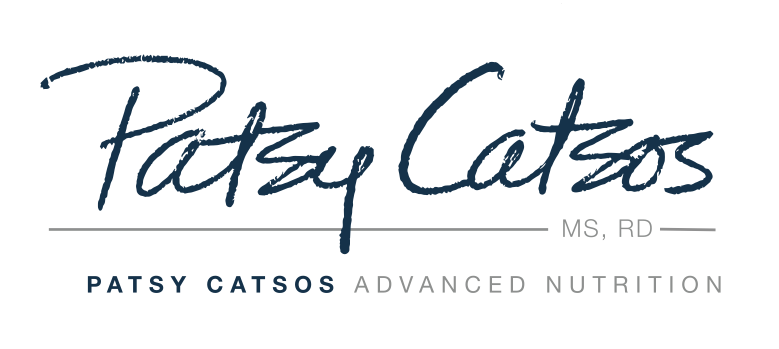A FODMAP elimination diet is not the type of diet meant to help people lose weight. In fact, some people with IBS actually need to gain weight for one reason or another. Unintentional weight loss can happen if you've been ill or if you've been over-restricting your diet trying to find relief of your abdominal pain, bloating, excess gas, diarrhea or constipation. Although mild, temporary weight loss might not be a serious threat to your health, if unintentional weight loss occurs along with abnormal lab values, fever, or bloody stools you should definitely seek evaluation by a gastroenterologist for a proper IBS diagnosis and to rule out other conditions. If weight loss has been significant or concerning, make an appointment with a dietitian to discuss how, and whether, to proceed with a FODMAP elimination diet.
It can be difficult to work your way back to a healthy weight, something that can be under-appreciated by others. Some patients share with me the compliments they've received about their weight loss, while on the inside they feel quite anxious about their seeming inability to gain weight. Gaining weight requires increasing your intake of calories, and usually, protein. Following a low-FODMAP diet need not make that any more difficult. In fact, a low-FODMAP diet can provide a framework for increasing your intake with foods that are less likely to trigger GI symptoms.
If you are young, or exercising heavily for work or play, you might need to eat more than other people, too. One memorable patient of mine was a tall, slightly underweight 18-year old male college student who had a very physical summer job, played soccer for a couple hours after work most nights, and had a lovely mom who prepared mostly vegetarian food at home, and plenty of it. Lots of beans and high-FODMAP vegetables were served in that household. He had to consume thousands of calories a day to support his needs--how could he do it, without blowing up?! His level of flatulence far exceeded the norm, and he had frequent morning stomach aches. Reducing his FODMAP intake, while eating plenty of lower-FODMAP foods, worked wonders for him!
The Low-FODMAP Pantry in The IBS Elimination Diet and Cookbook includes two "go-to" food groups for weight gain:
Oils
Oils do not contain any carbohydrates, and therefore, they are completely free of FODMAPs. Bite-for-bite, oils contribute twice the calories of proteins or carbohydrates. So the #1 weight gain strategy for people on low-FODMAP diets is to eat more healthy fats. Try these:
- olive oil
- avocado oil
- canola oil
- nut oils, like walnut oil
- seed oils, like sunflower or flax oil
I know, I know, you've always read that people with IBS shouldn't eat too much fat, but is that really true for you? Try it and see for yourself, before you limit your fat intake unnecessarily, based on over-generalized advice. You can probably tolerate more healthy fat than you think. There is a huge difference between a tablespoon of olive oil (13.5 grams of fat) and a batter-dipped, deep-fried onion (134 grams of fat--ouch). Just because fried foods make you feel sick, doesn't mean you can't put extra olive oil on your salad, or drizzle your roasted veggies liberally with oil. Add a shot of oil to your smoothies, or make them with ice cubes made of canned coconut cream. Double the amount of oil you use to sauté vegetables. Splurge on extra mayonnaise. If you have to limit fat intake because of another medical condition, you will need the assistance of a registered dietitian to help you plan your weight gain.
Meat, Fish, Poultry, and Eggs
High-protein foods are the next best low-FODMAP foods for weight gain, again because they are automatically low in both sugars and fibers. Also, if you want to gain weight in a healthful way, you need to provide your body with plenty of building material for strong muscles. Even the smooth muscles that make your gastrointestinal tract function smoothly require a steady diet of good protein sources. If you don't have any other health issues (such as kidney stones or kidney disease) that would make it inadvisable to eat more protein, you might try eating bigger portions of these foods:
Beef is a good source of protein on a low- FODMAP diet. These ingredients will make a tasty Asian-style broth for a beef soup: meaty bones, cloves, peppercorns, stick cinnamon, whole anise and yellow rock sugar.
- Beef
- Pork
- Chicken
- Fish
- Seafood
- Eggs
You must try these foods for yourself to see if you tolerate them. Don't over-restrict these foods based on outdated one-size-fits-all advice suggesting that people with IBS shouldn't eat beef or pork. Or because you've developed the mistaken impression that high-protein foods are only for people who want to lose weight. That isn't true. Protein is actually "nutrient #1" for everybody.
Supporting Players
- Nut butters like peanut butter or almond butter contribute calories and protein to a low-FODMAP diet, but they must be portion controlled (in general, limit these to 2 tablespoons or less).
- Cheese contributes, but due to relatively high sodium and saturated fat content, most people should eat cheese in moderation.
- Sourdough bread made from whole wheat or refined wheat flours tastes great. Gluten is not a FODMAP, so if you don't have a gluten-related disorder, put French toast, eggs and toast, and sandwiches back on the menu.
- Don't overlook beverages (smoothies, nutritional drinks, lactose-free milks, which can be easily taken between meals and sometimes go down more easily when we're not feeling well.
If you are a vegetarian or a vegan in need of weight gain, your low-FODMAP diet will require some extra planning to provide enough calories and protein. We have some ideas for you, but you may need to get some extra help from a medical professional who can monitor your nutrition status closely.
Please comment on this post with any weight gain suggestions you think might benefit other readers. Thanks!
This page may contain affiliate links. We are a participant in the Amazon Services LLC Associates Program, an affiliate advertising program designed to provide a means for us to earn fees by linking to Amazon.com and affiliated sites.


